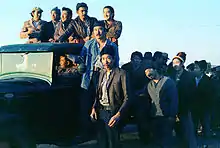Jeanne Wakatsuki Houston
Jeanne Wakatsuki Houston (born September 26, 1934) is an American writer. Her writings primarily focus on ethnic identity formation in the United States of America. She is best known for her autobiographical novel Farewell to Manzanar that narrates her personal experiences in World War II internment camps.
Jeanne Wakatsuki Houston | |
|---|---|
| Born | September 26, 1934 Inglewood, California |
| Alma mater | San Jose State University |
| Notable works | Farewell to Manzanar |
| Spouse | James D. Houston |
Biography
Houston was born in Inglewood, California, on September 26, 1934, attended Long Beach Polytechnic High School for three years and graduated from James Lick High School in San Jose. She was the youngest of four boys and six girls in the Wakatsuki family.[1]
For the first seven years she experienced a normal childhood. She lived in Los Angeles, California until 1942 when President Roosevelt signed Executive Order 9066, causing her and her family to be evacuated. They were forced to leave their home and be taken to Manzanar. She and her family spent the next three years in the camp, attempting to live a "normal" life behind barbed wire, under the watch of armed guards in searchlight towers. Despite their efforts, obstacles managed to get in the way: her father's drinking habits and aggressive abuse, having no freedom, and very little space in the cubicles. However, things eventually improved, and they learned to adapt to their environment. Several years after leaving the camp in 1945, Jeanne went to San Jose State College where she studied sociology and journalism and participated in the marching band's flag team.[2][3] She met her husband James D. Houston there, and they married in 1957. Jeanne later decided to tell her story about the time she spent in Manzanar in Farewell to Manzanar, co-authored by her husband, in 1972. Ten years after their marriage, in 1967, Jeanne gave birth to a girl. Six years later she gave birth to twins.
Other publications include Don't Cry, It's Only Thunder (1984) with Paul G. Hensler as co-author, and Beyond Manzanar and Other Views of Asian-American Womanhood (1985).
Farewell to Manzanar

In her book Farewell to Manzanar (1973), Houston writes about her family's experiences at Manzanar, an internment camp in California's Owens Valley where Japanese Americans were imprisoned during World War II.[2] The novel was adapted into a television movie in 1976, starring Nobu McCarthy, who portrayed both Houston as well as her mother in the film.[4]
Distribution
In an effort to educate Californians about the experiences of Japanese Americans who were imprisoned during World War II, the book and movie were distributed in 2002 as part of a kit to approximately 8,500 public elementary and secondary schools and 1,500 public libraries in California. The kit also included study guides tailored to the book, and a video teaching guide.[5]
See also
References
- "Discover Nikkei: Jeanne Wakatsuki Houston". DiscoverNikkei.org. 2007-01-09. Retrieved 2012-07-18.
- Houston, Jeanne Wakatsuki (1983) [1973]. Farewell To Manzanar: A True Story of Japanese American Experience During and After the World War II Internment. Laurel Leaf. ISBN 0-553-27258-6.
- "U.S., School Yearbooks, 1900-1999, San Jose State College, 1955". Ancestry.com. Retrieved 2020-08-28.
- "Farewell to Manzanar (1976) (TV)". National Broadcasting Corporation. Retrieved 2008-01-12.
- Pacyna, Deborah (2002-02-19). "Lt. Governor Cruz Bustamante Announces Distribution of 10,000 "Farewell to Manzanar" Educational Kits to Public Schools and Libraries" (Press release). Office of the Lieutenant Governor, State of California. Archived from the original on 2008-01-24. Retrieved 2008-01-12.
Critical studies
- "National and Ethnic Affiliation in Internment Autobiographies of Childhood by Jeanne Wakatsuki Houston and George Takei" By: Davis, Rocío G.; Amerikastudien/American Studies, 2006; 51 (3): 355-68. (journal article)
- "'But Isn't This the Land of the Free?': Resistance and Discovery in Student Responses to Farewell to Manzanar" By: Chappell, Virginia A.. pp. 172–88 IN: Severino, Carol (ed. and introd.); Guerra, Juan C. (ed. and introd.); Butler, Johnnella E. (ed. and introd.); Writing in Multicultural Settings. New York, NY: Modern Language Association of America; 1997. xi, 370 pp. (book article)
- "The Politics of Possession: The Negotiation of Identity in American in Disguise, Homebase, and Farewell to Manzanar" By: Sakurai, Patricia A.. pp. 157–70 IN: Okihiro, Gary Y. (ed. & introd.); Alquizola, Marilyn (ed.); Rony, Dorothy Fujita (ed.); Wong, K. Scott (ed.); Privileging Positions: The Sites of Asian American Studies. Pullman: Washington State UP; 1995. xiii, 448 pp. (book article)
- "The Politics of Possession: Negotiating Identities in American in Disguise, Homebase, and Farewell to Manzanar" By: Sakurai, Patricia A.; Hitting Critical Mass: A Journal of Asian American Cultural Criticism, 1993 Fall; 1 (1): 39-56. (journal article)